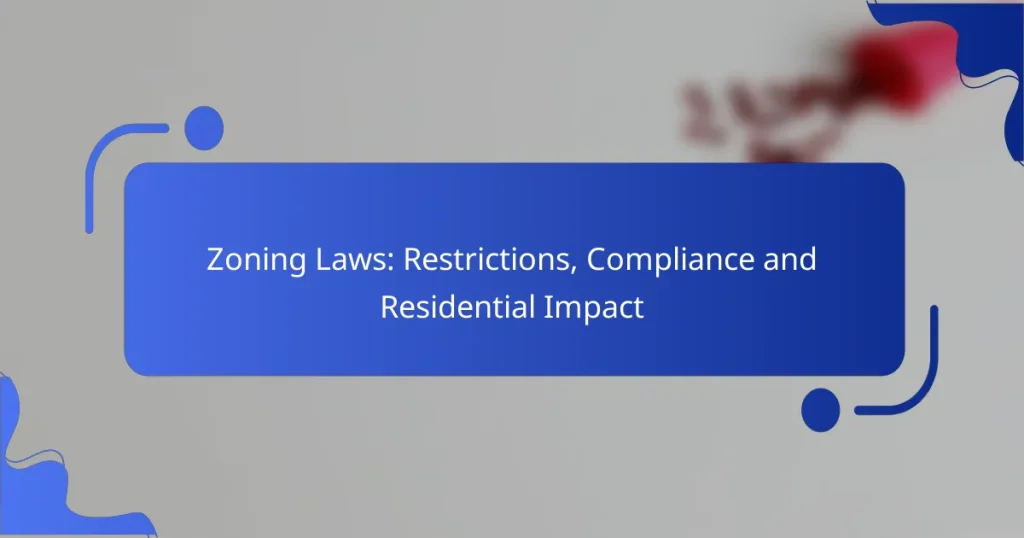Renovating your home requires a thorough understanding of the necessary permits and regulations to ensure compliance with local laws. In Los Angeles, various permits, such as building, electrical, and plumbing, are essential for maintaining safety standards. By following the structured application process and adhering to zoning regulations and building codes, homeowners can navigate the complexities of renovation projects effectively.
Legal Pitfalls: Common Issues, Prevention and Solutions
Necessary Permits: Application Process, Fees and Timelines
HOA Regulations: Guidelines, Compliance and Impact on Renovation
Zoning Laws: Restrictions, Compliance and Residential Impact
Local Building Codes: Compliance, Requirements and Updates
Working with Local Authorities: Communication, Documentation and Approval Process
What are the key renovation permits in Los Angeles?
In Los Angeles, key renovation permits include building, electrical, plumbing, mechanical, and demolition permits. Each type serves a specific purpose and is essential for ensuring compliance with local regulations and safety standards.
Building permits
Building permits are required for most construction and renovation projects in Los Angeles. These permits ensure that the work meets safety codes and zoning laws. Common projects needing a building permit include structural changes, additions, and significant remodels.
To obtain a building permit, you typically need to submit detailed plans and specifications to the Department of Building and Safety. Fees vary based on project scope, often ranging from a few hundred to several thousand dollars.
Electrical permits
Electrical permits are necessary for any work involving electrical systems, including installations, upgrades, and repairs. These permits help ensure that electrical work complies with safety standards, reducing the risk of hazards such as fires or electrocution.
When applying for an electrical permit, you will need to provide diagrams and specifications of the electrical system. Costs for electrical permits can vary, but they generally fall within the low hundreds of dollars.
Plumbing permits
Plumbing permits are required for any alterations or installations involving plumbing systems. This includes new pipe installations, sewer line replacements, and significant repairs. The permit process helps ensure that plumbing work meets health and safety regulations.
To secure a plumbing permit, you must submit plans that detail the proposed work. Fees for plumbing permits can also range from a couple of hundred to over a thousand dollars, depending on the project’s complexity.
Mechanical permits
Mechanical permits are essential for installing or modifying heating, ventilation, and air conditioning (HVAC) systems. These permits ensure that mechanical systems are safe and efficient, complying with local codes.
When applying for a mechanical permit, you will need to provide specifications for the equipment and installation plans. The cost for mechanical permits varies, typically falling within the range of a few hundred dollars.
Demolition permits
Demolition permits are required for any project that involves tearing down structures. This includes both partial and complete demolitions. Obtaining a demolition permit ensures that the process adheres to safety regulations and environmental standards.
To apply for a demolition permit, you must submit a plan that outlines the scope of the demolition. Fees can vary widely based on the size and complexity of the demolition, often ranging from several hundred to a few thousand dollars.
How to apply for renovation permits in California?
To apply for renovation permits in California, you need to follow a structured process that includes submitting an application to your local building department. This process ensures that your renovation complies with state and local regulations.
Online application process
The online application process for renovation permits in California typically involves visiting your local building department’s website. Many municipalities offer an online portal where you can fill out the application form, upload necessary documents, and pay fees electronically.
Ensure you have all required information ready, such as project details and property information, to streamline the submission. Some areas may require you to create an account to track your application status.
Required documentation
<pWhen applying for renovation permits, you will need to provide specific documentation to support your application. Common requirements include detailed project plans, site plans, and proof of ownership or authorization from the property owner.
Additionally, you may need to submit structural calculations or energy compliance documents, depending on the scope of your renovation. Always check with your local building department for a complete list of required documents.
Application fees
Application fees for renovation permits in California can vary widely based on the project size and complexity. Generally, fees can range from a few hundred to several thousand dollars, depending on local regulations.
It’s advisable to consult your local building department’s fee schedule before applying to avoid unexpected costs. Some jurisdictions may also charge additional fees for inspections or plan reviews, so factor these into your budget.
What are the common regulations for home renovations?
Common regulations for home renovations include zoning regulations, building codes, and historical preservation rules. Understanding these regulations is essential to ensure compliance and avoid potential legal issues during your renovation project.
Zoning regulations
Zoning regulations dictate how land can be used and what types of structures can be built in specific areas. These rules can vary significantly by location, affecting factors such as building height, density, and the types of renovations permitted.
Before starting a renovation, check with your local zoning office to confirm that your plans align with existing regulations. For example, if you live in a residential zone, converting a home into a commercial space may not be allowed.
Building codes
Building codes are standards established to ensure safety, health, and structural integrity in construction. These codes cover various aspects, including electrical, plumbing, and structural requirements, which must be adhered to during renovations.
When planning your project, consult the local building department to understand the applicable codes. Failing to comply can lead to fines or the need to redo work that does not meet standards.
Historical preservation rules
Historical preservation rules protect buildings of significant cultural or architectural value. If your home is located in a designated historic district, any renovations may require special permits and adherence to specific guidelines to maintain the property’s character.
Before proceeding with renovations on a historic property, contact your local preservation office to learn about the necessary approvals and restrictions. This can help you avoid costly mistakes and ensure your project honors the building’s historical significance.
What are the consequences of not obtaining renovation permits?
Failing to obtain renovation permits can lead to serious legal and financial repercussions. Homeowners may face fines, forced removal of unauthorized work, and a decrease in property value.
Fines and penalties
Not securing the necessary renovation permits can result in significant fines imposed by local authorities. These fines can vary widely, often ranging from a few hundred to several thousand dollars, depending on the severity of the violation and local regulations.
In addition to fines, repeated violations may lead to increased penalties or even legal action. It is crucial to check with local building departments to understand specific permit requirements and associated costs.
Forced removal of work
If renovations are completed without the proper permits, local authorities may require homeowners to remove or alter the work. This can be costly and time-consuming, often involving additional labor and materials to restore the property to its original state.
In some cases, homeowners may face a stop-work order, halting any ongoing projects until the necessary permits are obtained. This can delay timelines and increase overall renovation costs significantly.
Impact on property value
Unauthorized renovations can negatively affect a property’s market value. Potential buyers may be deterred by the lack of permits, viewing it as a red flag that could lead to future legal issues or costly repairs.
Additionally, if a property is appraised, unpermitted work may not be included in the valuation, resulting in a lower appraisal price. Ensuring all renovations are permitted helps maintain and potentially enhance property value over time.
What factors influence renovation permit approval?
Renovation permit approval is influenced by several key factors, including project scope, local zoning laws, and compliance with building codes. Understanding these elements can help streamline the approval process and avoid delays.
Project scope
The project scope refers to the extent and nature of the renovations planned. This includes the size of the area being renovated, the type of work (e.g., structural changes, electrical updates), and whether the project affects the building’s exterior or historical features.
When defining your project scope, consider how extensive the renovations are. Minor updates, such as painting or replacing fixtures, may require less scrutiny than major alterations like adding new rooms or changing the building’s footprint. Always check local regulations to determine what level of detail is necessary for your permit application.
Common pitfalls include underestimating the scope of work or failing to account for necessary inspections. To avoid issues, create a detailed project plan that outlines all aspects of the renovation, ensuring compliance with local codes and regulations.






